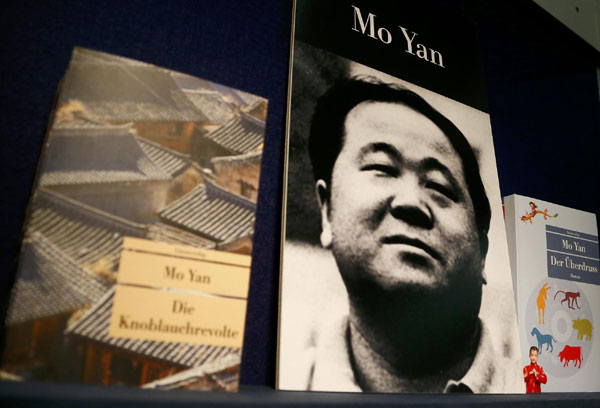
 'Taken 2' grabs movie box office crown
'Taken 2' grabs movie box office crown
 Rihanna's 'Diamonds' tops UK pop chart
Rihanna's 'Diamonds' tops UK pop chart
 Fans get look at vintage Rolling Stones
Fans get look at vintage Rolling Stones
 Celebrities attend Power of Women event
Celebrities attend Power of Women event
 Ang Lee breaks 'every rule' to make unlikely new Life of Pi film
Ang Lee breaks 'every rule' to make unlikely new Life of Pi film
 Rihanna almost thrown out of nightclub
Rihanna almost thrown out of nightclub
 'Dark Knight' wins weekend box office
'Dark Knight' wins weekend box office
 'Total Recall' stars gather in Beverly Hills
'Total Recall' stars gather in Beverly Hills
Chinese writer Mo Yan wins 2012 Nobel Prize in Literature
Updated: 2012-10-11 19:35
(Xinhua)
|
||||||||
|
 |
|
Books of Chinese writer Mo Yan are on display during the book fair in Frankfurt, October 11, 2012. [Photo/Agencies] |
STOCKHOLM - Chinese writer Mo Yan has won the 2012 Nobel Prize in Literature, announced Peter Englund, Permanent Secretary of the Swedish Academy in Stockholm on Thursday.
|
||||
Mo Yan, a pseudonym for Guan Moye, was born in 1955 and grew up in Gaomi in Shandong province in eastern China. His parents were farmers.
As a 12-year-old during the Cultural Revolution he left school to work, first in agriculture, later in a factory. In 1976 he joined the People's Liberation Army and during this time began to study literature and write. His first short story was published in a literary journal in 1981.
"In his writing, Mo Yan draws on his youthful experiences and on settings in the province of his birth. This is apparent in his novel Hong gaoliang jiazu (1987, in English Red Sorghum 1993)," said the academy in a statement of Mo's biography.
The book consists of five stories that unfold and interweave in Gaomi in several turbulent decades in the 20th century, with depictions of bandit culture, the Japanese occupation and the harsh conditions endured by poor farm workers, according to the biography. Red Sorghum was successfully filmed in 1987, directed by famous Chinese director Zhang Yimou.
Through a mixture of fantasy and reality, historical and social perspectives, Mo Yan has created a world reminiscent in its complexity of those in the writings of William Faulkner and Gabriel Garcia Marquez, at the same time finding a departure point in old Chinese literature and in oral tradition, the academy commented in the biographical statement.
In addition to his novels, Mo Yan has published many short stories and essays on various topics. Despite his social criticism, he is seen in his homeland as one of the foremost contemporary authors, the statement added.
Dozens of his works have been translated into English, French and Japanese and many other languages.
Last year's literature prize went to Swedish poet Tomas Transtromer.
Alfred Nobel, a Swedish industrialist who invented dynamite, established the Nobel Prizes in his will in 1895. The first awards were handed out six years later.
The awarding ceremony will be held on December 10.
The winner will win a medal, a personal diploma and a cash award of 8 million Swedish Kronor (about 1 million US dollars).
Most Viewed
Editor's Picks

|

|

|

|

|

|
Today's Top News
Health new priority for quake zone
Xi meets US top military officer
Japan's boats driven out of Diaoyu
China mulls online shopping legislation
Bird flu death toll rises to 22
Putin appoints new ambassador to China
Japanese ships blocked from Diaoyu Islands
Inspired by Guan, more Chinese pick up golf
US Weekly

|

|








